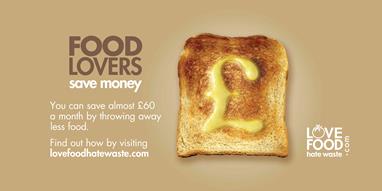 Love Food Hate Waste
Love Food Hate Waste

Every year in the UK we throw away £12.5bn worth of perfectly good food, costing the average family over £50 a month. We actually throw away more food than packaging from our homes in the UK every year.
If we all stop wasting food that could have been eaten, the benefit to the planet would be the equivalent of taking one in four cars off the road.
A lot of the waste is simply down to too much food being prepared, with cooked food more likely to end up in the bin rather than raw ingredients. Of our uncooked food, fruit and vegetables are the most likely to be thrown away without being used, followed by bread and cakes.
For more information, advice and ideas to help you reduce the amount of food you throw away you can visit the .Love Food Hate Waste website
Planning meals and making a shopping list helps you buy only what you are likely to eat.
Have a look at what`s already in your fridge and cupboards. Then make a flexible meal plan and think how to use what you`ve already got. Life can be busy, so plan for some quick and easy meals, especially for days know you will be busy. Planning meals takes some thought at first but this meal planning guide can help. Then you can use your meal plan to make a shopping list.That way, you buy what you need for those meals and avoid buying more of what you`ve already got!
Once you are used to it, planning saves money and saves time too, especially if you cook extra portions in advance.
According to research,41% of wasted food isn`t eaten in time. Knowing the difference between Use By and Best Before dates helps avoid binning food that is still perfectly edible.
A "Use-By" date on food is about safety. You can eat food until, and on, the Use-By date but not after. Food that has passed its Use-By date can be hazardous even if it looks and smells alright. But you can still freeze food right up to the "Use By" date.
"Best Before" dates are about food quality rather than safety. Properly stored, food should still be safe to eat after the Best Before date, just not be quite as fresh or tasty. Just check that it looks and smells alright to eat.
Check the labels too, for how to store food once you`ve opened it, and how long it keeps once open.
Storing food in the right place keeps it fresher for longer.
Most fruit and veg lasts best in the fridge. A fridge thermometer will tell you if your fridge is at the right temperature, 50C is the ideal temperature. A few things, such as bananas, onions, potatoes and fresh pineapple should be kept out of the fridge in a cool, well-ventilated place. Bread should also be kept out of the fridge in a cool dry place, or in the freezer. Bread goes stale 6 times faster if it is kept in the fridge.
One thing that confuses people, is where to keep eggs. Eggs should always be kept in the fridge. If you leave them in a basket on your worktop, the temperature can vary between day and night or if you have the heating on or off. Eggs like to be kept in a fridge where the temperature is constant.
Your freezer is your friend. Freezing acts as a pause button, so you can freeze food right up to (but not beyond) its "Use By" date. You can freeze lots of different foods - did you know you can freeze cheese?
For more information, try this guide to look up how to store, freeze and defrost all sorts of different foods.
25% of wasted food is a result of preparing and serving too much. This portion planner can help you prepare and serve the right amount in the first place. You can use it to work out how much to buy too. Buying loose fruit and veg helps you buy only what you need. Or buy frozen food, so you take out only what you need for that meal.
If you find people are still leaving food at the end of a meal, try using slightly smaller plates, or invite people to serve themselves.
If you have leftovers from a meal, cool them as quickly as possible and pop them into the fridge or freezer. They might do for lunch, or another meal. Use leftovers from the fridge within two days and reheat them thoroughly, making sure you only reheat food once. Leftover meat or poultry that was frozen before cooking can still be used to make a new meal which can then be frozen.
Rice is a little different, it needs to be cooled immediately under cold running water and then eaten within one day - make sure you heat it up well in a microwave.
Leftover ingredients can be used to make a new meal. If you are looking for ideas, try searching this page for some recipe suggestions.
And if you still have food that you can`t eat, you could use a food sharing App such as OLIO to share it with friends and neighbours.
Cumberland Council: 0300 373 3730
Westmorland & Furness Council: 0300 373 3300
